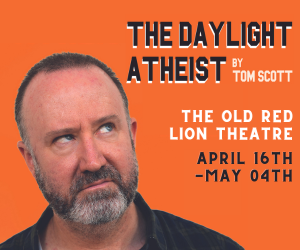For a production that is designed to break down the stigma of mental illness Disorder is disappointingly melodramatic.
Unfortunately this confusing piece fails in its laudable aim, due to a bad mixture of cliché, poor dialogue and sexism. Alice is a hardworking, ambitious and obsessive mother who loses everything to mental illness. However, this is only made clear by reading the show’s publicity material, as bipolar is hardly alluded to at all in the stilted, meandering and dull script. The figure of the disease is portrayed by a suited man who at first appears to be Alice’s boss and who also doubles as a narrator. Through some fairly cheesy staged movement he becomes the literal puppet master for her life but he would quite as easily represent the figure of work or evil capitalism. There is nothing explicit in the performance to make it clear that he is the physical presence of Alice’s illness, until the last scene, when her son takes on her burden and confronts the spectre.
The premise of Disorder is extremely sexist, as Alice is essentially punished for being a successful career woman. She loses everything because she spends every minute of her time working, ruining her relationship with her husband and son who (in another spectacular cliché) run into the arms of a pretty young nanny. The fact that the figure of Alice’s disorder is also her boss muddles the premise further as it rather implies that she wouldn’t have suffered from bipolar if she hadn’t pursued her career.
There’s also a bulky door standing in the middle of stage, separating Alice’s current location (incarceration in a mental home) with her memories of the past. The split stage is entirely unnecessary, cramping an already small space, so that movement is extremely limited. The script plods along interminably with very little compelling action to sustain our attention, the actors too lethargic to pump life into the flaccid dialogue.
The figure of the boss/bipolar disorder/narrator intersperses the scenes with equally turgid poetic quotes and pretentiously convoluted passages of description that are at odds with the colloquialism that otherwise typifies the writing. References to Munch’s Scream and quotes from T S Eliot’s The Wasteland are probably intended to create links to a wider cultural context of works, those that deal with themes of mental distress and psychosis, but are crowbarred in so clumsily they only go to confirm the play’s complete failure to add any original insight on the subject.
James (Alice’s husband) moves and reacts infuriatingly slowly, while both actors struggle to convey a naturalistic sense of intimacy between the couple. Alice’s voice is shrill, in what might be an attempt to convey her strained mental state, but her stilted movements lack variety and it is not clear that she is anything other than overtired. She eventually resorts to tragic gurning as her world falls apart around her, for seemingly no other reason than that she hasn’t been around enough.
For a production that is designed to break down the stigma of mental illness Disorder is disappointingly melodramatic. Haunted by the past, Alice is trapped in a hospital indefinitely and the individual complexities of bipolar disorder are left completely unaddressed, with little attempt made to portray how many people learn to cope with the illness.









